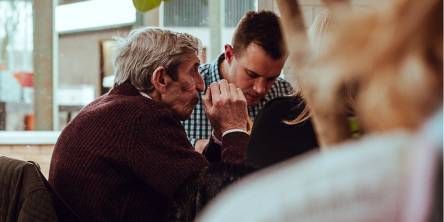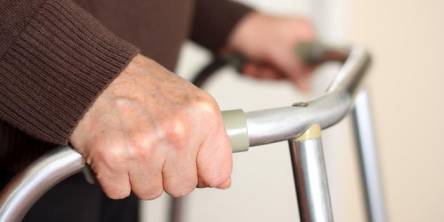Using Technology to Care for your Parents with Dementia
Dementia is a frightening condition with the primary symptom being declining memory loss and the overall inability to perform simple problem-solving tasks. Additionally, it impacts a person’s ability to think critically, whilst affecting the language patterns. It is a common occurrence among the elderly in society.
Though advancements in science and technology haven't come up with a cure, several useful innovations can offer some form of reprieve to family members and caregivers. These innovations help by reducing anxiety and stress, while at the same time enable limited freedoms for your parents. As a carer for a senior with dementia, these items will allow you to better care for your senior. You need all the assistance and aid possible in a way that will not frighten or concern your senior. By making small changes slowly, you can implement technology into your senior’s life, making both of your lives easier.
1. Special Digital clocks
A major problem facing patients with dementia is time-lapse, meaning they may not differentiate between night and day. These unique clocks help them interpret the time of day and keeps to a set routine and schedule. It may not be much, but any assistance with a schedule to dementia patients is important because it offers continuity as it helps them lead normal lives.
2. GPS location and tracking devices
Jayne Byrne, Project Coordinator at a nursing home, comments that it is a common occurrence for a person who has dementia to forget the way back home. Thanks to this innovation, caregivers and family members can track their movements and act in time if they notice wandering patterns. Many of these devices are worn on the arm like a bracelet ensuring that the patient’s movement can be monitored at all times. As a caregiver, you can connect your mobile with devices that are worn by your senior, allowing you to locate them should they wander off.
Many experts recommend keeping normal routines in your senior's daily life. By utilizing a GPS location device, your senior can still walk the dog or go shopping, normal everyday events that create a sense of normalcy.
3. Home care robots
Home care robots make everyone’s lives a little easier. They can clean the home and keep it clean for the entire day. Being robots, they follow a set schedule fed into their computer programs, meaning no medication or food will be skipped. They automatically charge themselves so you need not worry even when away. By utilizing a robot to vacuum the floor, you’re relieving your senior of a job that could be difficult or dangerous and as a carer, it would be one less job for you to take on.
4. CCTV in the home
Utilizing CCTV as you care for an individual with dementia offers you the opportunity to stay in touch with what your senior is doing when you cannot be with them. You can use it to ensure your senior is taking their medicine at the appropriate time or that your senior is doing ok when you’re not able to be with them.
5. Memory Aids
Memory aids are helpful reminders placed around the house to help your senior remember where items belong. Keeping items in their designated home will help your seniors find something when they need it. While these aren’t always technological, and oftentimes just pen and paper, they are a useful and necessary reminder.
Seniors suffering from dementia often take frequent doses of medicine, and it is natural to be concerned with their consumption or lack thereof. Utilizing a technological advancement, like a pillbox that will beep and opens only when it is time to take the medicine, allows your senior freedom to complete a task without nagging. Many other carers use devices with alarms, like mobiles and watches to remind a senior that it is time to take their medicine.
Memory aids can also be in the form of reminder messages that go off when a senior needs to complete a task. If the senior goes out the door, a pre-recorded message may go off reminding the senior to close the door or grab the keys. It may remind a senior and carer of upcoming appointments or simply offer reassurance that everything is okay.
Many other innovations are being rolled out helping dementia patients maintain their normal lives. But these five are essential and accessible by all. Most are not expensive and will greatly assist in easing the burden not only on the patient but family members as well. As a carer for seniors, keeping life simple and schedule is important and this technology will help you maintain continuity while providing loving care.
Similar Articles
For individuals requiring extensive support and assistance with daily activities, in-home care is an invaluable resource. This level of care provides continuous support and supervision, ensuring that individuals receive around-the-clock aid in the comfort and familiarity of their own homes.
When choosing an assisted living community, it is essential to consider the type and quality of food offered. This is generally one of the first things people look at when they tour different communities because it can affect the quality of life for residents immensely.
Summers mean several things for several people - numerous enjoyable outdoor activities such as picnics, swimming, barbecuing, and going to the beach, among others. However, the rising temperatures can pose major health risks, particularly for the elderly.
Old age comes with its own set of problems and one of the most serious issues the elderly have to face is heart problems. While heart issues can affect anyone, the risk of cardiovascular disease goes up as you get older. In fact, more than 67% of people between the ages of 60-79 years suffer from some form of heart disease.
This article will show you the six important steps you should follow when hiring an in-home care agency. Learn here more about how to find the right in-home care agency near your area.
Sheltered accommodation is another in the list of long-term elderly care options as opposed to care homes, care in the community or living with family. Often it is called warden-controlled accommodation, as this is one of the benefits, there is a warden on site usually 24 hours, they often live on site.
A fundamental part of giving care is being a good communicator with the person getting care. Care is given with respect for the dignity of the person receiving care. The carer remains in contact with the primary health care provider, often a doctor or nurse, and helps the person receiving care make decisions about their health and matters affecting their daily life.
When you take a look around, you realize that the country is aging and getting a few more gray hairs. More baby boomers are entering early retirement and modern medicine is helping us to live longer into our golden years.
Mobility aids are the best medical products used by the disabled and elderly to walk easily, which are not capable to move or walk freely on their own. Today, the market is flooded with many kinds of mobility aids.









